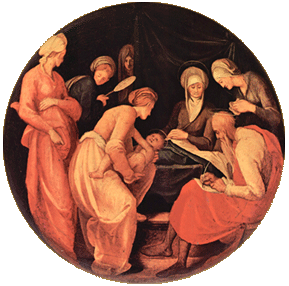
The life of John the Baptist is a preparation for the coming of Jesus Christ, and the circumstances of his birth are miraculous. In Luke’s Gospel, John’s parents, Zechariah and Elizabeth, were without children and beyond the age of child-bearing. During Zechariah’s time of priestly service in the Temple in Jerusalem, he is chosen to offer incense in the Holy Place. While there, the Archangel Gabriel appeared to him and announced that he and his wife will give birth to a child, and that they shall name him John. However, since Zechariah doubted the message, he was made mute until the time of John’s birth.
Here, a little math is in order. At the Annunciation, which we celebrated on March 25, the Archangel Gabriel appeared to the Virgin Mary to inform her that she would conceive Jesus. But Gabriel also informed her that Elizabeth, her cousin, was already six months pregnant (Lk 1:36). Since Elizabeth was six months pregnant on March 25, we celebrate John’s birth three months later on June 24.
The Nativity of John the Baptist is one of the oldest solemnities in the Church, having been recorded by the Council of Agde in 506 as one of Southern France’s principal holy days. The day is marked as the beginning of the preparation of the way of the Lord. Although rendered mute by his doubting God, Zechariah was obedient in naming his son John, and was inspired to proclaim the prophecy of the ministry of his son, the so-called “Canticle of Zechariah” (Lk 1:68-79): “Blessed be the Lord, The God of Israel; He has come to His people and set them free. He has raised up for us a mighty Savior, Born of the house of His servant David. Through His holy prophets He promised of old That He would save us from our enemies, From the hands of all who hate us. He promised to show mercy to our fathers And to remember His holy Covenant. This was the oath He swore to our father Abraham: To set us free from the hands of our enemies, Free to worship Him without fear, Holy and righteous in His sight All the days of our life. You, My child shall be called The prophet of the Most High, For you will go before the Lord to prepare His way, To give his people knowledge of salvation By the forgiveness of their sins. In the tender compassion of our Lord The dawn from on high shall break upon us, to shine on those who dwell in darkness And the shadow of death, And to guide our feet into the way of peace.”




